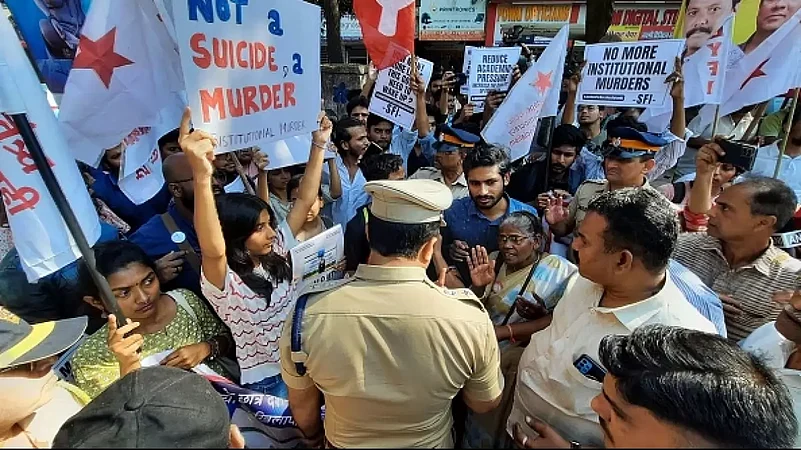While there has been increasing growth in suicide cases in IITs, the recent suicide case in IIT Delhi, in which a 20-year-old B.tech student was found hanging in the college hostel in July 2023, has finally reopened conversations around caste-based discrimination in these premiere institutes.
Previously in response to a question raised in Rajya Sabha, Subhas Sarkar, Minister of State Education attributed the spike in suicide (33 in the past 5 years) to academic stress, family reasons, personal reasons, mental health issues, etc. Incidentally, despite half of the cases being victims belonging to SC/ ST and OBCs, caste-based discrimination was not given a mention in the reasons stated.
In answer to another query, Sarkar submitted that 2544 OBC candidates, 1362 SC and 538 ST students dropped out of IITs between 2018-2023. The corrective measures prescribed by the Government ( fee reduction, waiver of tuition fees and remedial classes) were once again made towards academic and financial reasons ignoring the social hierarchies in the institutions.
Pranav Jeevan on the other hand, in his article for Round Table India asserts that authorities fall back on using academic failure as the major reason for such suicide cases in lieu of acknowledging any form of caste-based discrimination.
The case of IIT Delhi was preceded by cases in both IIT- Bombay and Madras belonging to depressed classes, the hegemony of caste present in these institutions has once again been highlighted, bringing this discussion to the forefront.
IIT-Bombay administration has refuted all claims of caste identity being a concerning factor in the case of the suicide of 18-year-old Darshan Solanki. The internal committee ruled “no specific evidence of caste-based discrimination” in the matter.
Life in IITs
“For the first month, freshers cannot talk to anyone outside their professors and DSW representatives. During these initial times, conversations revolve around coachings, ranks and quotas of each other to a larger extent,” says Shubhankar, a second-year IIT-D student.
He then goes on to talk about how peer groups are formed on the basis of ranks and how a large number of people are unable to migrate out of these groups once intermingling is possible (through various cultural events).
In an elite institute with ranks and quota certificates hanging on the head of each student and an institution primarily favouring fluent English, social interactions on an individual level are largely impossible.
In addition to this, another from IIT Delhi revealed their experience, shedding light on the unfriendly environment faced by minority students due to discrimination from other students. The student stated, "From the very first day of college, they inquired about our JEE rank, specifically to identify those who gained admission through reservation. Personally, I have also encountered instances of discrimination both in college and in the hostel. I have witnessed the formation of WhatsApp groups exclusively for students belonging to the same caste."
While talking about discrimination the student also revealed, "Students from upper castes often hold the perception that those who gained admission through reservation are not as intelligent due to the reservations they received." Additionally, the student noted, "There is also another form of discrimination within the IITs, particularly among students in branches with higher cutoffs like computer science. They tend to regard students from other branches as inferior."
How effective are the corrective measures undertaken by IIT institutes
In light of recent suicide cases, different IIT institutes are setting in place mechanisms to combat the issue under UGC guidelines.
IIT Delhi administration recently stated that it will seriously investigate all charges of discrimination (whether such discrimination be overt or implied) against students, staff or faculty belonging to SC/ST categories.
During our own investigation into its online SC/ST/OBC portal, however, many links were broken.
We reached out to the concerned authorities, however, they were unreachable an answer.
IIT-Bombay has its own grievance redressal cells for students belonging to SC, ST, OBC and PWD backgrounds. Under the name of OBC and SC/ST/PWD Liaison Cell, the online page contains the names and details of the persons in charge only.
The Round Table Conference further posits that the administration has “nothing describing the powers and responsibilities of the cell” nor is there a “proper grievance redressal mechanism”. “Everything functions arbitrarily...There is no mention of course of action to be undertaken” - hence for all intents and purposes rendering such cells advisory in nature.
A total of 16 out of 23 of the dedicated cells for the welfare of scheduled caste and scheduled tribe (SC-ST) students are non-functional, data obtained under the Right to Information (RTI) Act filed by Ambedkar Periyar Phule Study Circle (APPSC). There is no fear of repercussion among the concerned authorities who fail to take cognisance of the matter even now.
Primary research across institutes reveals that a majority of the appointed Counselors belong to dominant castes, furthermore, there is no mention of their qualification in handling cases based on caste discrimination
While diversity inclusion workshops, seminars and dialogues are held across many of these institutes, the attendance of students is not mandatory, hence proving to be underutilized as a sensitizing medium.
What strikes clear as day is that despite the rising cases, IITs across the country are hesitant to acknowledge the institutionalized casteism within their campuses. This is further cemented by their unserious stance on creating a robust grievance redressal system. The current structures are in for a major overhaul in order to tackle the rising cases of death by suicide among IIT students





















